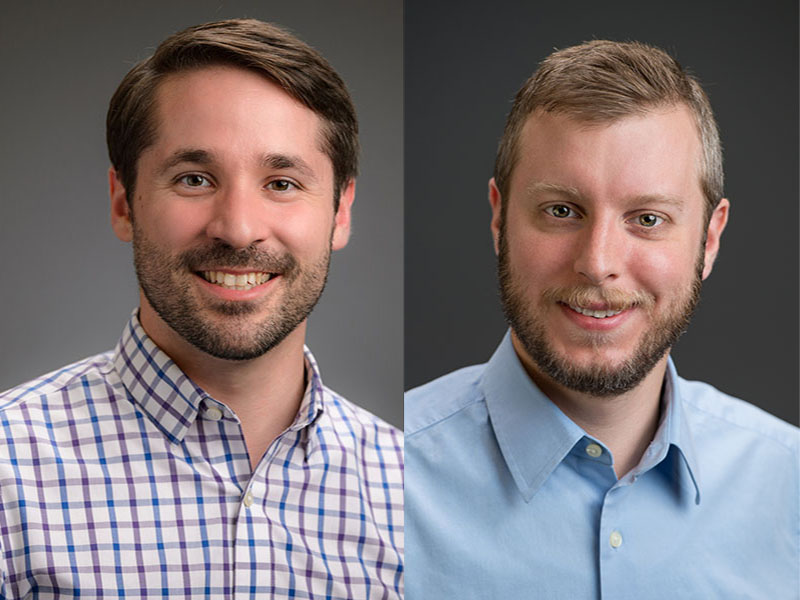Two Villanova University Professors, Scott Dietrich, PhD, and Joseph Toscano, PhD, Receive CAREER Grants from the National Science Foundation (NSF)
Since 2017, seven Villanova faculty members have now received NSF CAREER Awards

Pictured left to right: Scott Dietrich, PhD, assistant professor of Physics, and Joseph Toscano, PhD, assistant professor of Psychological and Brain Sciences, named recipients of NSF CAREER Awards.
VILLANOVA, Pa. — Two faculty members from Villanova University’s College of Liberal Arts and Sciences have been named recipients of the Faculty Early Career Development (CAREER) Award from the National Science Foundation (NSF). The awards will allow Scott Dietrich, PhD, assistant professor of Physics, and Joseph Toscano, PhD, assistant professor of Psychological and Brain Sciences, to advance research in the areas of quantum electronics and language processing, respectively. Both professors received five-year grants, Dietrich for $594,000 and Toscano for $605,000.
Since 2017, seven Villanova faculty members have received NSF CAREER Awards, the most prestigious award supporting career-development activities for teacher-scholars who most effectively integrate research and education within the context of the mission of their organization.
“The continued selection of Villanova professors as NSF CAREER Award recipients highlights the talent and impact of our outstanding teacher-scholars,” said Amanda Grannas, PhD, Associate Vice Provost for Research, Chief Research Officer and professor of Chemistry. Grannas, a 2006 recipient of an NSF CAREER Award, continued, “This award has a transformative effect on the research trajectory of early-career faculty. We congratulate Dr. Dietrich and Dr. Toscano on this momentous achievement.”
Dietrich, an expert in nanoelectronics—the use of nanotechnology in electronic components—will investigate the collective behavior of electrons by using microwave radiation to characterize new electronic phases and properties, the discovery of which can ultimately lead to the development of new technologies. Dietrich’s project, “Microwave Transmission Spectroscopy of Van Der Waals Materials,” will involve Villanova STEM undergraduate and graduate researchers. The team will measure the properties of fragile electronic states in highly interacting electronic systems.
“This grant will enable us to address fundamental questions at the frontiers of highly interacting electronic systems in materials that will advance the field of quantum electronics,” Dietrich said.
Dietrich and his students will use microwave transmission spectroscopy to study collective electronic states in van der Waals materials at low temperatures and high magnetic fields by coupling microwave radiation to the two-dimensional electron system through an adjacent coplanar waveguide. The project will include the design and introduction of a new interdisciplinary nanofabrication course that will bring together Villanova Physics and Engineering students in one classroom and laboratory.
In addition, Dietrich’s grant will support educational outreach focusing on K-12 students in the greater Philadelphia region through partnerships with local libraries, as well as with public and private schools.
Toscano, an expert in human speech recognition and language comprehension, will investigate how people understand spoken language in different contexts by studying brain responses to speech and developing computer models that recognize spoken words. Language is involved in nearly every aspect of our daily lives, but researchers do not fully understand how the brain transforms sounds into meaningful words. As part of their research, Toscano and his students will measure brain responses occurring in the first few hundred milliseconds after hearing a sound. By studying these early brain responses, they hope to determine how a listener’s expectation influences their perception.
“Our goal is to provide insights into the neuroscience of speech perception and help us understand how we can build computer systems that process language in ways similar to humans,” said Toscano. “We will be able to identify what information the listener uses to form these expectations, allowing them to quickly and accurately understand spoken language.”
The research team will also create neural network models that use techniques from machine learning to recognize speech and are trained in a way that mimics how children learn language. The behavior of the model will be compared with data from human listeners to determine whether it captures the way the brain understands spoken language and whether it forms the same kinds of expectations as listeners.
The techniques developed from this research will also be used in classroom and laboratory settings to train undergraduate and graduate students in advanced computational and neuroscience techniques.
About Villanova University: Since 1842, Villanova University’s Augustinian Catholic intellectual tradition has been the cornerstone of an academic community in which students learn to think critically, act compassionately and succeed while serving others. There are more than 10,000 undergraduate, graduate and law students in the University's six colleges—the College of Liberal Arts and Sciences, the Villanova School of Business, the College of Engineering, the M. Louise Fitzpatrick College of Nursing, the College of Professional Studies and the Villanova University Charles Widger School of Law. Ranked among the nation’s top universities, Villanova supports its students’ intellectual growth and prepares them to become ethical leaders who create positive change everywhere life takes them. For more, visit www.villanova.edu.
